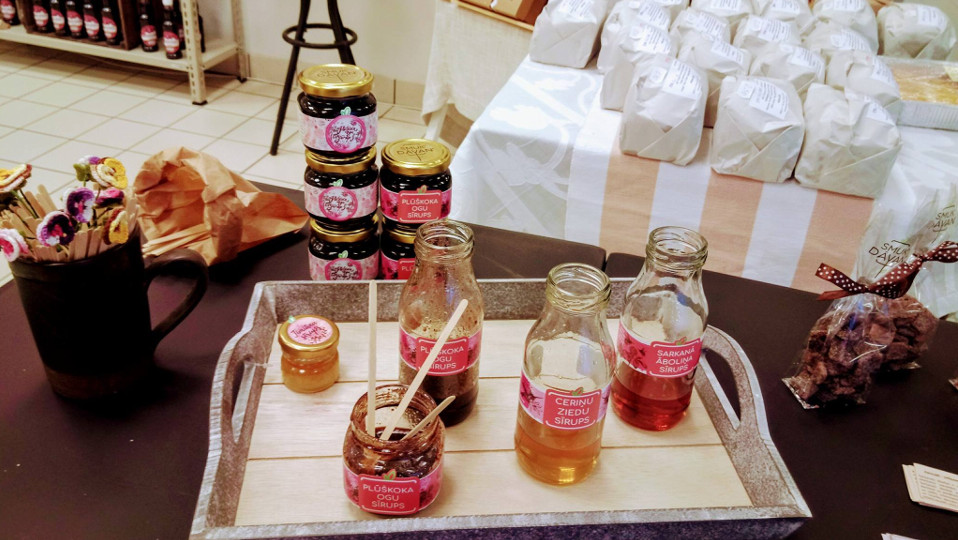Once they had to start adding VAT to their bills, a home producers store in Grobiņa lost 20% of their turnover after raising prices. Mothers with children who want clean products and older people looking for a taste of childhood make up most of home product consumers, and most of them consider these prices to be too expensive and prefer to shop at a supermarket instead.
Join a cooperative and spread out the cost
Cooperative chair Gunita Šternberga describes the members of her home products shop Kuldīgas labumi (Kuldīga Goodies) as pioneers in the Kurzeme region. The shop has been operating since 2014, and today it's modern and cozy with a broad selection.
"As the manager I, along with customers, encourage producers with new ideas for expanding on what they offer. We had a girl who once only baked bread, now she also bakes honey cake and is about to offer bread soup and bread crumbs,” said Šternberga.
She explains that compared to a union, cooperatives have broader opportunities in terms of operations and participation in projects. “We've implemented two “Leader” projects: first, we installed new display stands and equipment necessary for the shop, second, we acquired a baking oven for baking sklandrauši (traditional Kurzeme carrot cake) so they would be warm and fragrant, and a vacuum packager for our members,” continued the manager.
“The law dictated that home producers can't sell their products in retail, but can sell them at fairs and markets. It was a municipality initiative – we started to think how we could unite to attend expositions together,” said Šternberga.
As this is very expensive, they realized that uniting into a cooperative, home producers could minimize costs and create a marketing base. The cooperative currently has 35 members, but the number is constantly changing. But it's not always smooth sailing.
"This isn't a private organization, the cooperative belongs to members. We are forced to add on VAT and make our products more expensive and inaccessible to those who would buy them,” said Šternberga.
Home producers have to pay VAT to get into supermarkets
Agricultural cooperative Talsu novada garša (Talsi district taste) Board Chair Dzintars Silgals is also a farmer and strawberry grower, so he understands how the product travels from the producer to the consumer, and how it's impacted by VAT.
“It's a big trade tax, because practically 85% of suppliers don't pay VAT, and for us, we have to pay VAT, which means that the product becomes more expensive for the end consumer at this point,” said Silgals.
Latvian Association of Agricultural Cooperatives CEO Linda Uzkalne said there are currently two home producer cooperatives active in the association, however there are many more in Latvia, as well as unions. We've tried to contact all of them in the last year and a half. The cooperatives specifically have made a large contribution toward development.
“It's our goal to consolidate cooperatives where these producers have united. To secure a stable market in supermarkets as well. Home producers frequently aren't ready to put in the work to ensure a long term supply,” said Uzkalne.
The association CEO thinks the situation around VAT payment keeps the home producers from expanding and encourages them to keep selling products themselves or in markets. “The ideal option would be to change regulations for such cooperatives that buy from home producers, and not make them pay VAT. I have to say honesty, taking into account the economic situation in the country, I doubt we could accomplish that,” said Uzkalne. There has also been a proposal to decrease VAT for specific product groups.
“That would partly solve the situation for cooperatives. The product list that we proposed for a 5% VAT was fresh milk, bread, eggs and fresh meat,” continued Uzkalne.
Finance Ministry says increasing purchasing power is solution
In Latvia there is a 40 000 euro threshold for paying VAT. Finance Ministry Deputy Secretary of State for Taxes, Customs and Accounting Ilmārs Šņucins says a lowe VAT won't be possible suggest cooperatives and unions find other solutions.
"The tax rate is connected to the products and is applied evenly, it's not even important in which country it's produced. Small producers have other support mechanisms, simpler accounting and others” said Šņucins.
In regards to a lower VAT for specific products, as it is currently for fruits and vegetables, this will be the third year of implementation and analysis will be necessary in cooperation with the Ministry of Agriculture, according to the deputy secretary of state. He said the overall purchasing power of consumers must be improved.
Despite the various hardships and changes that will be encountered over the long-term, home producer unions and cooperatives can see future cooperation in other areas as well, such as logistics and the way products reach shops. Meanwhile cooperative shops will remain a point of interest both for local consumers and foreign tourists.






























